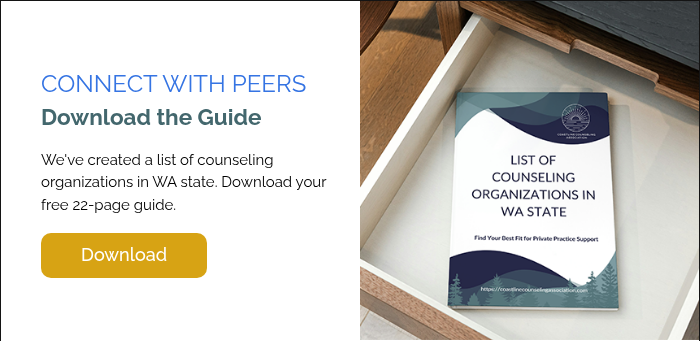
Why Every Counselor Should Have One
Private practice can be deeply rewarding—but it can also be isolating. Without coworkers down the hall, it’s easy to go days (or weeks) without connecting with another professional who truly understands your work. That’s where peer consultation groups come in.
Peer consultation groups are intentional gatherings of therapists who meet regularly to discuss cases, share resources, brainstorm solutions, and offer one another professional and emotional support. Whether you’re in Seattle, Spokane, or a rural Washington community, they can be one of the most valuable—and sustainable—supports for your practice.
Why Peer Consultation Groups Matter
They reduce professional isolation.
Working alone can make even experienced counselors second-guess themselves. Peer consultation gives you a place to process challenges, celebrate successes, and remember you’re not alone in the hard moments.
They sharpen your clinical skills.
When colleagues share perspectives on a case, you gain fresh ideas and interventions you might not have considered. Over time, this makes you a stronger, more adaptable clinician.
They help with ethical decision-making.
WA State law requires us to uphold high ethical standards. Having trusted peers to consult with can help you spot blind spots, ensure you’re staying within your scope, and document your clinical reasoning.
They support your mental health.
Our work involves holding space for grief, trauma, and complex human struggles. Peer groups can be a safe outlet to process the emotional weight of the work—so you can show up fully for your clients.
How to Start or Join a Peer Consultation Group
- Clarify your goals.
Do you want a group focused on a specific modality (EMDR, CBT, somatic work) or population (couples, teens, trauma)? Or would you prefer a general practice group?
- Decide on format.
In-person: Great for building deep connection, but may be harder to coordinate.
Virtual: Ideal for statewide participation—especially since WA’s telehealth rules make it possible to connect with providers anywhere in the state.
- Set ground rules.
Confidentiality is non-negotiable. Decide how long each member will have for case presentations. Agree on how to give feedback (supportive, nonjudgmental, focused on client well-being).
- Commit to consistency.
Monthly or biweekly meetings work best. Put them on the calendar months in advance to ensure attendance.
Tips for Making Peer Consultation Work for You
- Bring real cases. The more vulnerable and honest you are, the more you’ll benefit.
- Share resources. From articles to trainings, what helps you may help others.
- Rotate facilitation. This keeps the group balanced and avoids burnout for any one member.
- Check in on group fit. Every few months, revisit whether the group is meeting everyone’s needs.
Final Thoughts
In Washington, where the counseling community is both diverse and widespread, peer consultation groups can be a lifeline. They offer a place to grow professionally, stay grounded ethically, and stay connected to the joy and humanity of the work. By joining our Association, you’ll have a built-in network of other therapists. We also facilitate monthly peer consultation groups to ensure opportunities for connection.
Your clients benefit when you feel supported, resourced, and less alone. So if you don’t already have a peer consultation group—start looking for one today. Your future self will thank you.






